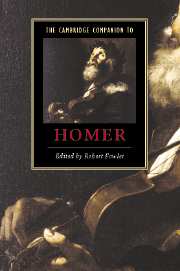Book contents
- Frontmatter
- 1 Introduction
- Part 1 The poems and their narrator
- Part 2 The characters
- Part 3 The poet’s craft
- 8 Formulas, metre and type-scenes
- 9 Similes and other likenesses
- 10 The speeches
- Part 4 Text and context
- Part 5 Homeric receptions
- Dateline
- List of works cited
- Index of passages discussed
- General Index
10 - The speeches
from Part 3 - The poet’s craft
Published online by Cambridge University Press: 28 May 2006
- Frontmatter
- 1 Introduction
- Part 1 The poems and their narrator
- Part 2 The characters
- Part 3 The poet’s craft
- 8 Formulas, metre and type-scenes
- 9 Similes and other likenesses
- 10 The speeches
- Part 4 Text and context
- Part 5 Homeric receptions
- Dateline
- List of works cited
- Index of passages discussed
- General Index
Summary
Is it that Homer talks about different things from all other poets? Doesn’t he talk mostly about war and the dealings of men with one another: good men and bad, laymen and craftsmen; and the dealings of gods with men?
(Plato, Ion 531c)More than half of the Homeric epics consists of speech by characters, not narrative by the narrator. That is a very high proportion, and the speeches, with their scope, variety, and vividness, are a striking feature of the poems. That was to have momentous consequences. Homer is, as Plato says, the first and greatest of the tragic poets; and without the example of Homer, showing the heroes and heroines of myth conversing in dialogue in a high style, Attic tragedy would never have come into existence in the form that it did. That would have had grave implications for the plays of Seneca, and consequently for all European verse drama, including Shakespeare. It was the Homeric epics which showed how it was possible to present great figures, participants in elevated and significant action, conversing in a manner which was at once dignified and true to convincing human psychology. From Homer the line runs to Aeschylus' Agamemnon and Shakespeare’s Antony and Cleopatra. By contrast Virgil, who took so much from Homer, does not excel at dialogue and never has extended conversations. Dialogue in the Aeneid is normally just statement and reply, and a famous scene with Dido is broken off with Aeneas 'still having much to say'.
- Type
- Chapter
- Information
- The Cambridge Companion to Homer , pp. 156 - 168Publisher: Cambridge University PressPrint publication year: 2004
- 10
- Cited by



